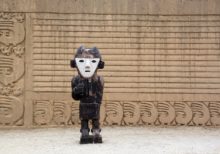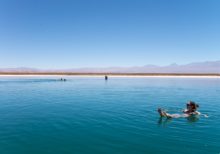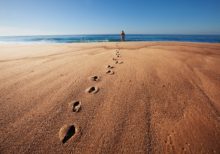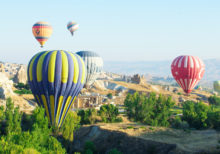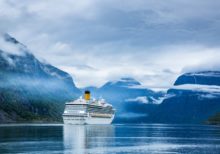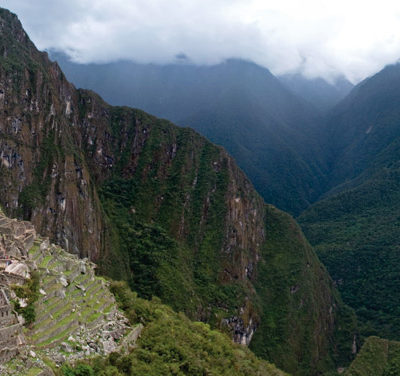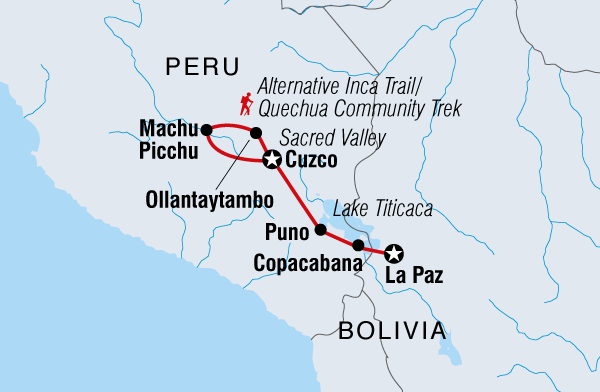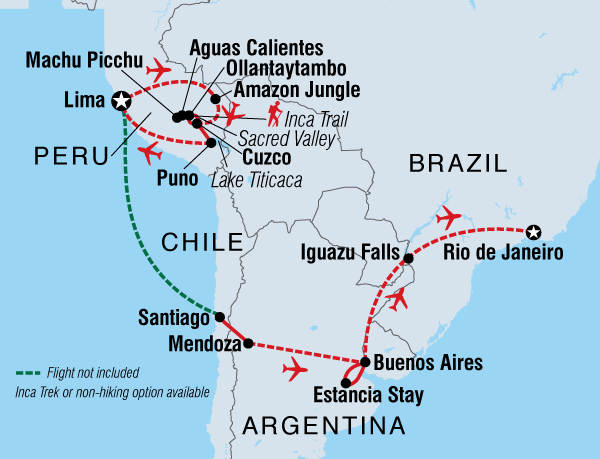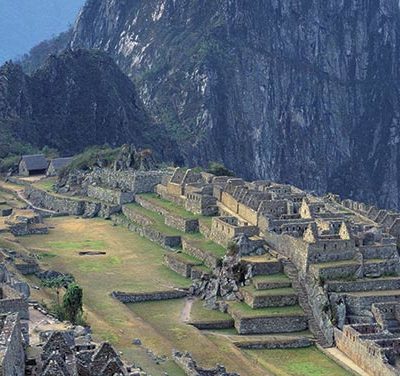| Starts | Lima, Peru |
|---|---|
| Ends | Buenos Aires, Argentina |
| Region | Peru |
| Duration | 21 days |
| Tour Operator | Intrepid Travel |
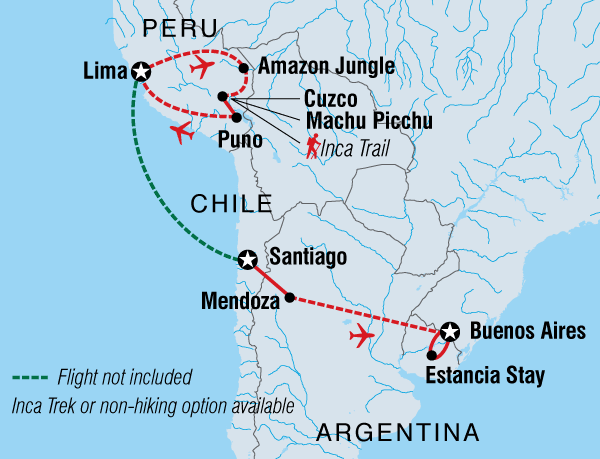
Itinerary
Day 1 - Starting: Lima & Finishing: Lima
Welcome to Peru. Arrive Lima and take your complimentary transfer to the joining hotel. In the afternoon around 2 pm, there will be a welcome briefing at the hotel with your leader. Please look for a note in the hotel lobby or ask reception where it will take place. Please have your insurance details and next of kin information on hand for collection. If you're going to be late, please inform hotel reception. Later in the day your leader will take you on a walking tour through Peru's capital – Lima was in its prime during the Spanish colonial days and much of the city's attraction now lies in its well-preserved historical centre. First, visit the Central Market where you will tour the aisles, packed with fruits, vegetables and even Guinea pigs, and try some local Peruvian fruits and street food. After visiting nearby Chinatown (Peru’s population consists of 2% Chinese immigrants), continue to visit the nearby San Francisco Monastery. Descend to its catacombs containing some 70,000 human remains, and visit a library that houses one of Lima's oldest collections of books. Take a short walk to the Plaza Mayor, the oldest public place in Lima, where the baroque facades evoke the days of Spanish colonial rule. Then there’s the option to go for an included dinner in Down Town or back to Miraflores. Notes: In any spare time, or if you arrive early, you might enjoy wandering around Miraflores, visiting Parque del Amor (Love's Park) where you can enjoy a view across Lima's beaches, or dropping in to one of the fascinating museums. Altitude Sickness - This trip visits places that are at high altitude, and as a result, some people can suffer from altitude sickness, regardless of age or physical health. Please see the ‘Health’ section of the trip notes for more important information on this.
Day 2 - Starting: Amazon Jungle & Finishing: Amazon Jungle
Fly from Lima to Puerto Maldonado today (approximately 2 hours). Upon arrival, the lodge staff will take you to their office in town, where you'll leave the majority of your luggage in safe storage. You'll continue travelling with a small pack with only the necessary items for your next two nights in the jungle. Leave civilisation behind and venture deep into the Amazon rainforest by motorised canoe, up river to your jungle lodge in the Madre de Dios region. Posada Amazonas is a rainforest lodge that's just a 45-minute boat ride from Puerto Maldonado. The lodge is owned by the indigenous Ese-Eja community of Infierno, and offers a 30-metre canopy tower that provides spectacular views of the vast expanses of forest, Tambopata River and endless opportunities to witness Amazonian wildlife. The lodge is eco-friendly and combines low-impact architecture with traditional native style. Rooms are simple, but comfortable with flush toilets (en suite), showers (cold water only). Use your evening for relaxing and getting to know the local community. Notes: Numerous kerosene lamps and candles provide lighting. Electricity and internet are only available in the common areas of the lodge.
Day 3 - Starting: Amazon Jungle & Finishing: Amazon Jungle
This morning, head into the beating heart of the Amazon jungle with your local, multilingual guides, encountering magnificent fauna and flora in their natural habitat. Spot monkeys leaping through the trees, see multi-coloured macaws gather at a clay lick, see thousands of swirling butterflies, and keep an eye out for a family of otters. The guides can also teach you about the medicinal properties and practical uses of the plants. After your hike finishes in the afternoon, it’s time to get back in the canoe and return to Puerto Maldonado. You're then free to sit back and relax in the comfort of your lodge.
Day 4 - Starting: Cuzco & Finishing: Cuzco
After exploring the wilds, it's time to jump back in the canoe and return to Puerto Maldonado. Then take a short flight to Cuzco (approximately 35 minutes). Acclimatise to the altitude and wealth of sights here. The Cuzco region truly is the heart and soul of Peru. The city itself is the continent's oldest continuously inhabited city, and was the home of the Incas for two centuries before the Spanish built their first capital here. This is a city steeped in history, tradition and legend and is a perfect base for exploring the Inca world or enjoying a range of outdoor activities. Your leader will take you on a walking tour through the World Heritage-listed streets, where colonial buildings sit on Inca foundations and you can feel the energy and history of past generations. The tour will include a visit to the Coca Museum – where you can learn about a plant that has been an essential part of life in the Andes for centuries – and the local San Pedro market. Here you will find vegetables, meats, local cheeses (which you should certainly try), local chocolates, herbal medicines and many local handicrafts. It’s a great place to purchase some souvenirs. Many locals come to the market to eat ‘mystery soups’. Some may be just chicken, however the most popular amongst the locals are the more unusual ones like frog soup, or those that contains nose to tail of various animals.
Day 5 - Starting: Sacred Valley/Ollantaytambo & Finishing: Sacred Valley/Ollantaytambo
Travel by private bus for around two hours through the Sacred Valley, on the outskirts of Cuzco. Known as Wilcamayo by the Incas, this valley was greatly treasured because of its climate, fertile land and the presence of the Urubamba (Sacred) River. Long the main source of food for the high Andes, maize crops can be seen surrounding the river and covering the terraces carved high into the valley walls. At the Sacred Valley you will visit the fortress of Sacsayhuaman, where massive stone blocks that form the walls of this site give you an impressive picture of how greatly developed Inca engineering was. Looking over the city from its hilltop position, the fortress is the ultimate example of the Inca's military strength. En route to Ollantaytambo you will visit a local community to gain a greater insight into the local lifestyle. If your visit coincides with market day (Sunday, Tuesday and Thursday), spend time browsing the stalls in search of hand-painted beads or warm ponchos. Ollantaytambo was built over an ancient Inca town, the ruins of the royal estate of Emperor Pachacuti. This is one of the few places where the Incas defeated the Spanish. It's a magnificent example of Inca urban planning and the perfect warm up for Machu Picchu. Ollantaytambo's archaeological site is located to the east of the Plaza de Armas. The upper terraces of this site offer great photo opportunities of the squared grid town below.
Day 6 - Starting: Inca Trail / Quarry Trail or Train option & Finishing: Inca Trail / Quarry Trail or Train option
Depending on the travel arrangements you made before the trip, during the next four days you’ll be doing one of the following: hiking the Classic Inca Trail, hiking the Inca Quarry Trail, or staying in Cuzco for another two days before taking the train to Aguas Calientes. While away from Cuzco, the bulk of your luggage will be stored at your hotel. If you’re hiking the Inca Trail or the Inca Quarry Trail, the evening before you leave Cuzco you'll receive a small duffle bag to carry your clothes in for the next four days (6 kg maximum). Our team of porters will carry these bags for you, together with the food and equipment for the trail. Please note that you won't have access to these items until the end of each day, as the porters will always be ahead of the group. If you’re travelling to Aguas Calientes by train, you'll be able to leave most of your luggage at the hotel in Cuzco and only travel with the necessary items during the excursion by train. Route 1 Classic Inca Trail: Today travel by minivan to the 82 kilometres marker and meet your crew of local porters, cook and guide. The first day includes uphill trekking to the campsite, which is at 3,100 metres above sea level. On the way you’ll see the Inca sites of Ollantaytambo, Huillca Raccay and Llactapata, as well as incredible views of snow-capped Veronica Peak. In the evening, unwind at the campsite with a nourishing meal. Notes: The Inca Trail is within the abilities of most reasonably fit people, but please come prepared, as the trail is 45 kilometres long and often steep. Each day's journey generally consists of seven hours of walking (uphill and downhill), with stops for snacks and lunch. Trekking usually begins at 7 am (except on the fourth morning) and you reach the campsite around 5 pm. Accommodation on the trek is camping (three nights). Double tents (twin-share) and foam camping mats will be provided. The porters will set up the tents while the cook prepares meals. Route 2 Quarry Trail: Make an early start today and drive to Choquequilla, a small ceremonial place where Incas worshipped the moon. Drive to the starting point of the trek, Rafq'a, and meet the horsemen who join us on the hike. After an hour’s walk, reach the small community of Socma. Carry on to the Perolniyoc cascade lookout, an opportunity to stop for photos and a food break. Continue to the campsite, which is 3,700 meters above sea level. You should reach the campsite around lunchtime. After lunch, set off to explore the Q'orimarca archaeological site, which once served as a checkpoint to the Incas. Notes: The Quarry Trail is within the abilities of most reasonably fit people. The hike is 26 kilometres long in total and its highest pass is at 4,450 meters above sea level. Throughout the trek, horses will carry your gear and camping equipment. The first two nights are spent camping and the third night you will stay at a simple hotel. Double tents (twin-share) and foam camping mats will be provided. The porters will set up the tents while the cook prepares meals. Route 3 Train: For those travellers disinterested in hiking the trail or who are unable to, spend two extra nights in Cuzco before travelling by bus to Ollantaytambo. From here take a train through the winding Urubamba Valley to the town of Aguas Calientes where you’ll spend a third night. Notes: Included lunch and dinner on this day is for people trekking the Inca or Quarry Trail only.
Day 7 - Starting: Inca Trail / Quarry Trail or Train option & Finishing: Inca Trail / Quarry Trail or Train option
Route 1 Classic Inca Trail: This is the most challenging day of the trek, as you ascend a long steep path (approximately five hours) to reach the highest point of the trail. Colloquially known as 'Dead Woman's Pass', Warmiwanusca sits at a height of 4,200 meters above sea level, providing amazing views of the valley below. The group will then descend to the campsite in the Pacaymayo Valley at 3,650 metres. Route 2 Quarry Trail: This is the most challenging and rewarding day of the hike. A three-hour walk takes us to the top of the first pass of Puccaqasa (approximately 4,370 meters). After enjoying picturesque views of the valley, it’s a short walk before stopping for lunch. Afterwards, make the two-hour hike to Kuychicassa, the highest pass of the trek at 4,450 meters. From here, descend to the sacred site the Incas called Intipunku (Sun Gate), with views of the Nevado Veronica mountain. Head to the campsite, which is only a stone’s throw away at Choquetacarpo. Route 3 Train: Today, perhaps use your free day indulging your inner foodie in the eateries of Cuzco. Head to lunch at the arty Fallen Angel restaurant, and if you still have room for dessert, the ChocoMuseo offers tastings and chocolate-marking workshops. For you to make the most of your free time in Cuzco, your trip includes a “Full Boleto Turistico”, a tourist pass that gives you access to 16 archaeological sites in and around Cuzco, including Qenqo, Tambomachay, Pukapukara, Saqsaywaman, amongst others. Notes: Included lunch and dinner on this day is for people trekking the Inca or Quarry Trail only.
Day 8 - Starting: Inca Trail / Quarry Trail or Train option & Finishing: Inca Trail / Quarry Trail or Train option
Route 1 Classic Inca Trail: Start the day with a climb through the Pacaymayo Valley to Runkuracay pass (3,980 metres). Enjoy views of the snow-capped mountain of Cordillera Vilcabamba before descending for around two to three hours to the ruins of Sayacmarca. Continue over the trail’s third pass to the ruins of Phuyupatamarca (3,850 metres), also known as the 'Town Above the Clouds'. Start the two-hour descent down the Inca steps to the final night's campsite by the Winay Wayna archaeological site. Route 2 Quarry Trail: Today’s hike will all be downhill. The first stop is the incomplete Kachiqata quarry, where the Incas were intercepted by the Spanish. Around midday, come to the end of the trek. Explore the cobbled streets of Ollantaytambo before taking the short train journey to Aguas Calientes. This is where you’ll meet up with the travellers in your group who didn't hike. Visiting the natural hot springs in town is a soothing way to spend the late afternoon. Spend the night in a comfortable hotel before tomorrow’s visit to Machu Picchu. Route 3 Train: In the morning take the three-hour train to the town of Aguas Calientes, which is nestled in the hills at the foot of Machu Picchu. For those who want to, there’s time to visit Machu Picchu independently before the guided tour the next day. If you’d like to do this, please advise your group leader at the welcome meeting at the start of the trip. Otherwise, you might like to while away the afternoon in the natural hot springs of Aguas Calientes. Notes: Included lunch and dinner on this day is for people trekking the Inca or Quarry Trail only.
Day 9 - Starting: Machu Picchu/Cuzco & Finishing: Machu Picchu/Cuzco
Route 1 Inca Trail: This is the final and most spectacular leg of the trek to Machu Picchu. The day starts before dawn with breakfast at 4.30 am. Say farewell to the porters as they descend to the train station, and begin hiking by 5.30 am. The walk to Intipunku (the Sun Gate) takes around two-and-a-half hours. Weather permitting, enjoy unforgettable views over Machu Pichu, ‘Lost City of the Incas’, as the sun rises (and before it’s crawling with tourists). Route 2 Quarry Trail: Depending on weather conditions, take a bus at 5:30 am this morning along the winding road to Machu Picchu (around 30 minutes). At Machu Picchu, join up with the travellers in your group who hiked the Classic Inca Trail. If skies are clear, enjoy a spectacular sunrise over the ancient city from the Sun Gate, before going on a guided walk around the ruins. Route 3 Train: Take an early bus up to Machu Picchu at 5.30 am. The city was built around 1440 AD as a country retreat for Incan nobility, but there’s evidence that the land had been a sacred Incan site for much longer. Take a guided tour around the ruins of temples, palaces and living quarters, and enjoy free time afterwards to wander around on your own before the group returns to Cuzco. For all trails – after taking advantage of the seemingly endless photo opportunities, it's time to return to Cuzco for a well-deserved shower and a pisco sour. Your evening is then free. Notes: Due to Intrepid's internal safety policy, our leaders are specifically prohibited from recommending or assisting with booking trips to the mountaintop ruins of Wayna Picchu.
Day 10 - Starting: Cuzco & Finishing: Cuzco
Today enjoy free time to relax, shop or explore more of Cuzco's sights. Perhaps head to a cafe on the Plaza de Armas, or for those seeking an active adventure, try mountain biking in the hills surrounding Cuzco. A "full boleto turistico" will give you access to the archaeological sites of Qenqo and Tambomachay, on the outskirts of Cuzco.
Day 11 - Starting: Puno & Finishing: Puno
Travel by comfortable public bus (with reclining chairs) for around 6 hours to the tiny but unique town of Puno, which will be more or less a full day's journey. This will take you on decent roads through spectacular mountain scenery, with the chance to stop at several sites along the way, including adobe Inca ruins. Along the way you'll also make a short roadside stop at La Raya, which at 4,335 metres is the highest point of your journey. You will also drive through the large sprawling town of Juliaca on your way to Puno, which is a colourful and lively place renowned for its traditional street dancing, often performed in celebration of Catholic festive days in February each year. You will then arrive in Puno, located on the shores of Lake Titicaca, a melting pot of Aymara and Quechuan Indian culture where traditional Andean customs are still strongly represented. The town is known as the folklore capital of Peru and is famous for its traditional dances. Many festivals are celebrated here, especially the Virgen de la Candelaria, so if you're lucky your visit might coincide with one of the colourful evening parades, when the streets fill with costumed dancers and musicians.
Day 12 - Starting: Lake Titicaca / Puno & Finishing: Lake Titicaca / Puno
High up in the Peruvian mountains lie the mystical blue waters of Lake Titicaca, the highest navigable lake in the world. From the shoreline, the water stretches out almost as far as the eye can see, its expanses just waiting to be explored. Today, sail across Titicaca to the intriguing floating islands of the Uros. The Uros originally built their islands to isolate themselves from rival tribes. The islands are built from many layers of totora reeds that grow in the shallows of the lake. As the reeds closest to the water begin to rot, more layers are added on top. These reeds are used for making everything on the islands, including boats that can last up to 12 months. Here you will set foot on the islands and learn about a unique traditional lifestyle that’s been around since pre-Inca times. You will visit Taquile Island, a place where knitting is strictly the domain of men, with women focusing on spinning. This is the place to get your hands on some beautiful knitwear. You will hike uphill for an hour to reach the main part of the island, and enjoy great views across the lake. There will be an optional lunch here as well, with a simple set menu of quinoa soup and muna tea (Andean mint tea). You will return down 500 steps to the boat that will take you on the three-hour journey back to Puno. Puno is the hometown of Kusimayo, a terrific local organisation that works towards improving the living condition of children and adults affected by poverty and malnutrition in this part of the world you have now come to know so well. Take a look at this short video for more information on this wonderful project: https://vimeo.com/154422813 Kusimayo is supported by the Intrepid Foundation which means you can donate to this project and your donation will be match dollar for dollar by the Intrepid Group. Please donate through our website: http://www.theintrepidfoundation.org/projects/kusimayo/
Day 13 - Starting: Lima & Finishing: Lima
You will fly to Lima from Puno today (approximately 1-2 hours). If time permits you will have the opportunity to visit the Sillustani archaeological site, a collection of ruined towers built by a pre-Inca civilisation near Lake Umayo. The ruined 'chullpas' or funeral towers of Sillustani were built by a pre-Inca civilisation centuries ago to house the remains of noble men, and are fitted with offerings to help secure their passage into the next life. Lima has some of the best cuisine in South America and is especially renowned for its seafood. Tonight, perhaps sample Peru's national dish of Ceviche, which is raw fish marinated in lime juice and often served with hot peppers.
Day 14 - Starting: Santiago & Finishing: Santiago
You will need to book a flight from La Paz to Santiago for today. This flight is not included in the price of your trip and will need to be arranged separately. Please book an earlier flight today as this evening you will have a group meeting in Santiago at approximately 6pm. If you arrive early into Santiago, perhaps head out on a short walk to get your bearings of the city, with the Andes as a spectacular backdrop. With the picturesque Plaza de Armas, thriving cafe culture, eclectic array of shops, booming arts scene and vibrant night-life, Santiago is a fun and rewarding capital to explore. Notes: Please advise us of your flight arrival details at least 14 days prior to departure for the complimentary airport transfer. If you’re taking a transfer with us and have arrived on a domestic flight, please leave through Door 2.
Day 15 - Starting: Santiago & Finishing: Santiago
Today you will get to grips with Santiago on an orientation walk with your leader – the city centre itself is quite small and simple to get around. You’ll discover more about this city, which was founded in 1541 by the Spaniard Pedro de Valdivia, and has experienced a turbulent history that has included native wars, floods and earthquakes. Head to the Plaza de Armas, the heart of the city and home to the cathedral. The cathedral has recently undergone renovations, so now is the ideal time to visit. Take time to wander the rest of the city, which is a jumble of shops, restaurants and parks. Perhaps walk through the main avenues of old Santiago to the Bohemian neighbourhood of Bella Vista, Santiago's Parisian Quarter, which offers a slightly more serene perspective on the Chilean capital. Maybe take the cable car to Cerro San Cristobal for a magnificent panoramic view of the city and the Andes mountain range. You could visit the modern parts of Santiago to see elegant residential neighbourhoods, shopping and financial districts. Perhaps take the chance to dine out at one of the city's famous restaurants tonight.
Day 16 - Starting: Mendoza & Finishing: Mendoza
In the morning, travel through the Andes and across the Argentinian border by local bus to Mendoza (approximately 6-7 hours). It’s a good idea to bring plenty of water and snacks, as the trip may incur delays. On a clear day it may be possible to see Mount Aconcagua, the highest mountain in the Americas at 6,962 meters above sea level. Please note that crossing the border can take up to three hours depending on local traffic. Once in Mendoza, get to know the city with a gentle stroll around its tree-lined streets, or visit the local cafes and restaurants for some Argentinian fare. When the sun goes down, head for the lively bars and clubs of Aristides Villanueva Street.
Day 17 - Starting: Mendoza & Finishing: Mendoza
This morning head out on a winery tour, which includes lunch. Mendoza is synonymous with wine, the destination for those who love to sip, slurp and spit. It is Argentina's most prolific and significant grape-growing region, producing nearly three-quarters of the country's wine. The climate produces an excellent variety of grapes, with the region's signature being Malbec. Visit several wineries and cellar doors today, tasting Malbec, Torrontes and other local varietals along the way. In the evening, perhaps test how refined your palate is by attempting to pair the perfect wine with an authentic Argentine asado (barbecue-style food). Tonight, if you're feeling adventurous, try one of the most popular drinks in town: fernet with coke – an acquired taste and not for the faint-hearted!
Day 18 - Starting: Estancia Stay & Finishing: Estancia Stay
Today fly from Mendoza to Buenos Aires, which only takes around one and a half hours. On arrival, travel in a minivan for around two hours to a traditional estancia (cattle ranch). This is where the group will be staying for the next couple of days. Arrive in time for afternoon tea and explore the grounds. If there’s time in the evening, perhaps go for a swim in the pool to freshen up after a long day.
Day 19 - Starting: Estancia Stay & Finishing: Estancia Stay
During your time on the estancia you can do as much or as little as you desire. Activities may also vary depending on the day. You could go horse riding, work with the cattle, take a cooking class or learn more about the sport of polo. Alternatively you could laze by the pool and read or have a barbecue. Estancias are ideal for relaxation and provide a great base for activities. Please remember that activities vary depending on the days that you are there. If in doubt, ask your trip leader for more information.
Day 20 - Starting: Buenos Aires & Finishing: Buenos Aires
After breakfast journey to cosmopolitan Buenos Aires to experience its old charm and modern energy (approximately 2 hours). After checking in to the hotel, enjoy free time to soak up the Argentinian capital’s irrepressible mix of European and Latin culture. Perhaps uncover the different districts of the city, each with its own unique take on Argentine street life and where all the Portenos (local residents) are justifiably proud of their city. Explore the colourful neighbourhood of La Boca or take some time to visit the elaborate tombs on display in the famous Recoleta Cemetery. Maybe window shop down historic avenues, weave through market stalls sandwiched between colourful houses, attended a raucous football match, or gorge yourself on the city's sophisticated culture and food. Make the most of your final evening by spending the night in a tango bar, being seduced by the world's most passionate dance, or in one of the capital’s famous steakhouses.
Day 21 - Starting: Buenos Aires & Finishing: Buenos Aires
On the final day of the trip, enjoy an orientation walk of the city. Visit the antique markets and artist displays of San Telmo, and the presidential palace of the Casa Rosada (Pink House) in the Plaza de Mayo. After the walk, your adventure comes to an end around midday. Check out from the hotel is at noon, but you can arrange to store your luggage with the front desk.
View Dates

